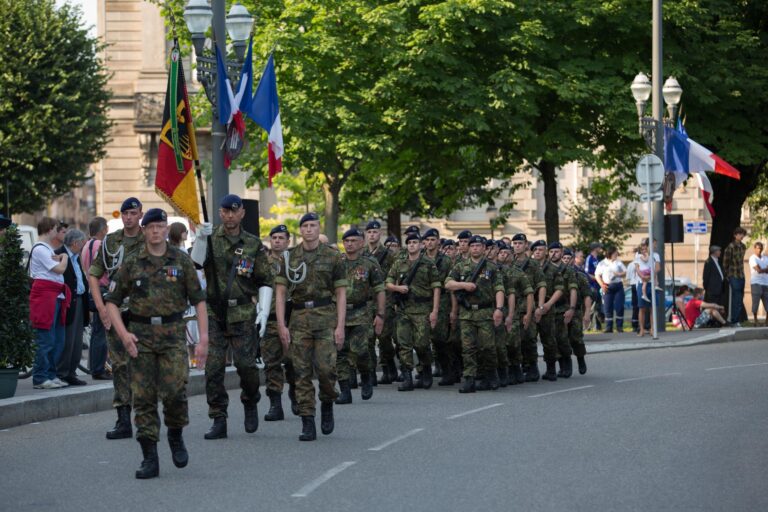The Franco-German Brigade and the Revival of European Defense
In an era marked by shifting geopolitical landscapes and mounting security threats, Europe finds itself at a pivotal crossroads. The establishment of the Franco-German Brigade, a symbol of military cooperation between two of the continent’s most influential nations, is poised to rejuvenate European defense mechanisms. As outlined by the Institut Français des Relations Internationales (IFRI), this initiative is not merely a response to immediate challenges but a strategic move toward enhanced cohesion within the European Union. With defense spending on the rise and calls for greater autonomy from NATO echoing across the continent, the brigade embodies a renewed commitment to collective security. As tensions escalate in Eastern Europe and beyond, the implications of this cooperation could extend far beyond Franco-German borders, potentially reshaping the very fabric of European defense policy.
The Evolution of the Franco-German Brigade in European Defense Strategy
The Franco-German Brigade, formed in 1989, has undergone significant transformations in response to shifting geopolitical landscapes and the evolving nature of security threats in Europe. Initially conceived as a symbol of reconciliation and cooperation between France and Germany, the brigade has gradually adapted to encompass a broader European defense strategy. With the increasing assertiveness of global powers and emerging challenges such as cyber warfare, terrorism, and hybrid threats, it has become imperative for the brigade to not only enhance its operational capabilities but also strengthen its role within NATO and the European Union framework. This evolution reflects a collective recognition that robust European defense hinges on enduring partnerships and collaborative military action.
As part of this strategic shift, the brigade has embraced joint exercises and expanded its scope to include multinational forces, thereby fostering greater integration within the European defense architecture. Key developments include:
- Increased Joint Exercises: Regular large-scale training operations that involve multiple European nations.
- Enhanced Capabilities: Incorporation of advanced technologies such as drones and cybersecurity units.
- Greater Interoperability: Standardization of equipment and procedures across participating nations.
These initiatives not only aim to enhance readiness but also facilitate a unified European response to crises. The evolution of the Franco-German Brigade serves as a cornerstone in the broader narrative of European defense revival, demonstrating a commitment to collective security and strategic autonomy in an increasingly unpredictable world.
Assessing the Impact of the Brigade on NATO and EU Military Cooperation
The establishment of the Franco-German Brigade has reinvigorated discussions around military cooperation within NATO and the European Union, reinforcing the need for a more integrated defense framework. As Europe faces mounting security challenges, this brigade serves as a symbol of joint commitment and strategic collaboration. It enables member states to share resources, streamline decision-making processes, and operate under a unified command structure, thereby enhancing overall operational effectiveness. The brigade not only strengthens bilateral ties between France and Germany but also serves as a model for future joint initiatives across NATO and the EU.
Furthermore, this intensified collaboration highlights the implications for global security dynamics. As NATO seeks to balance collective defense commitments with evolving threats, the Brigade’s operational capabilities contribute to a more agile response framework. Key benefits include:
- Shared Intelligence: Enhanced data sharing promotes better situational awareness.
- Joint Exercises: Frequent drills improve interoperability among European forces.
- Resource Optimization: Collaborative budgeting allows for pooled assets, reducing individual member costs.
In this context, the Franco-German Brigade emerges not just as a military asset, but as a pivotal player in shaping policies and fostering deeper military cooperation across Europe. By aligning defense strategies, NATO and the EU can collectively navigate an increasingly complex security landscape, underscoring the necessity for a robust and resilient European defense posture.
Strengthening Defense Capabilities through Joint Training and Innovation
The Franco-German Brigade exemplifies the potential of collaborative military training in enhancing defense readiness across Europe. Through shared exercises, personnel from both nations develop vital skills and foster interoperability, essential for modern military engagements. Such initiatives not only focus on tactical proficiency but also emphasize strategic innovation, incorporating cutting-edge technologies and methodologies into training programs. This approach highlights a commitment to a robust collective defense posture, ensuring that member states are not only prepared for traditional threats but also adaptable to complex, asymmetrical challenges.
The integration of joint training programs has led to noteworthy advancements in defense capabilities. Key areas of focus include:
- Cyber Defense: Joint simulations and threat assessments to bolster cyber resilience.
- Logistics and Supply Chain: Streamlined operational frameworks to enhance responsiveness during missions.
- Intelligence Sharing: Establishing protocols for real-time data exchange to inform decision-making in crisis situations.
Furthermore, the emphasis on innovation fosters a culture of shared learning, paving the way for new strategies and tools that strengthen Europe’s collective defense. As nations recognize the necessity of a united front, the Franco-German Brigade serves as a model for how pragmatic collaboration can achieve a truly integrated European defense framework.
Recommendations for Enhancing Franco-German Collaboration in Future Security Initiatives
In light of recent geopolitical challenges, it is essential to broaden the Franco-German partnership beyond traditional confines. A multifaceted approach that integrates economic, technological, and military cooperation can emphasize shared responsibilities. Key initiatives could include:
- Joint Research and Development Projects: Invest in cutting-edge defense technologies, focusing on cyber capabilities and unmanned systems.
- Cascading Military Exercises: Increase the frequency of joint training operations to ensure interoperability between forces.
- Collaborative Defense Procurement: Streamline acquisitions for shared projects to reduce costs and improve efficiency.
- Enhanced Intelligence Sharing: Establish frameworks for real-time data exchange to address emerging threats proactively.
Furthermore, fostering a holistic cultural exchange within the military community can build stronger bonds and trust. Engaging young professionals through internship and scholarship programs can invigorate the collaborative spirit. Possible avenues include:
- Joint Military Academies: Create programs for officers from both nations to study and train together.
- Cultural Workshops: Facilitate dialogues on shared history and values to strengthen relationship foundations.
- Public Awareness Campaigns: Highlight success stories of Franco-German initiatives to foster public support.
Concluding Remarks
In conclusion, the establishment of the Franco-German Brigade marks a pivotal step in the revival of European defense collaboration. This initiative not only strengthens bilateral ties between France and Germany but also serves as a potential catalyst for a more unified European defense strategy. As security challenges continue to evolve, the success of the Brigade could influence how Europe approaches collective defense and military cooperation in the coming years. As the continent grapples with rising geopolitical tensions, the Franco-German Brigade symbolizes a renewed commitment to solidarity within Europe. The outcome of this venture will be closely watched, as it may ultimately redefine Europe’s security architecture and its role on the global stage.




